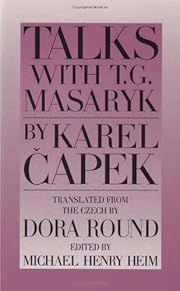

Cliquer sur une vignette pour aller sur Google Books.
|
Chargement... Entretiens avec Masarykpar Karel ČAPEK, Tomáš Garrigue Masaryk
 Aucun Actuellement, il n'y a pas de discussions au sujet de ce livre. aucune critique | ajouter une critique
Never have two such important world figures collaborated in a biography: Tomás Garrigue Masaryk (1850-1937), the original philosopher-president who founded Czechoslovakia in 1918, and Karel Capek (1890-1938), the leading Czech writer of the time. Capek interviewed Masaryk over a number of years and produced a single narrative that tells Masaryk's incredible story in a voice as ordinary yet magical as the best of Capek's fictional characters. The result is a biographical work like no other, in form or in content. Aucune description trouvée dans une bibliothèque |
Discussion en coursAucunCouvertures populaires
 Google Books — Chargement... Google Books — Chargement...GenresClassification décimale de Melvil (CDD)943.7History and Geography Europe Germany and central Europe Czech Republic and SlovakiaClassification de la Bibliothèque du CongrèsÉvaluationMoyenne: (4.13) (4.13)
Est-ce vous ?Devenez un(e) auteur LibraryThing. |
||||||||||||||||||||||||||||||||||||||||||||||||||||||||||||||||||||||||||||||||||||||||||||||||||||||||||||||||||||||||||
Later in his life, a series of conversations with the well-known writer Karel Čapek were turned into a book, Talks with T. G. Masaryk. This version, by Catbird Press, has a couple prefatory essays by Čapek, then the rest of the book is in Masaryk’s own words. It’s engagingly and simply written, and Čapek has structured the book in a more or less chronological order, with all the tangents Masaryk takes generally related to the subject at hand. Masaryk is eager to elaborate on education of children or the value of religious rituals in a small community or his studies of foreign literature, but will often offhandedly mention his brushes with spies and death or his being chosen as president. Čapek and Masaryk were friendly (there’s a cute cartoon of the two of them in the book), and Čapek was a good choice for an idiosyncratic Masaryk biography – both have an idealistic, humanistic worldview, although there’s a strong strain of pragmatism in Masaryk’s actions and words.
Masaryk has many warm memories of his childhood, but notes that his father was essentially a serf. The family moved around frequently and his schooling was similarly haphazard – a few years here and there, training and tutoring in various positions. Masaryk spent a number of years in Vienna. As he grew older, the conflict between Germans and Czechs would regularly appear. As a boy, he identified with his village instead of a nation, but he found that he was not accepted by the German students at school. The constant puzzling over and identifying with various nations is a frequent theme for Masaryk. He had an exceptionally wide range of interests and describes his avid reading and book collecting – very enjoyable. He even notes that his interest in Czech literature was rather belated.
As Masaryk moved into academia, he became involved in all the political struggles that one would expect in that arena. His descriptions of the controversies that he became embroiled in are a little short on detail – probably unsurprisingly, he expected his audience to be aware of the scandals in the not too distant past. Also, there is some name-dropping and while I recognized a lot of the Czech and foreign historical and cultural figures, I wasn’t familiar with the current Czech and Austrian politicians (except Beneš, Masaryk’s longtime second in command).
I could definitely believe that Masaryk would rather be sitting in his study reading than out leading the nation, but he did get involved in a number of debates and eventually politics – there was at least a strong sense of duty, possibly some self-righteousness. His simple narrative style sometimes almost downplays dramatic events – Čapek notes this in one of his opening essays (where Masaryk refused to lie to get into a hotel when shooting was going on outside, but his description of his motivation is matter-of-fact). Similarly, when describing his leaving the country at the outbreak of war, the narration is a bit flat. His descriptions of moving among various European countries and America – dealing with spies and intelligence and negotiations – are very interesting. I especially enjoyed his analyses and comparisons of the different nations. He concludes with the presidency, although that chapter is not too detailed. However, Čapek ends with his warm and idealistic summation of the past and hopes for the future.
Some of his ideas and beliefs are very much of the time, but this is a good account of an impressive and interesting man in his own words. (